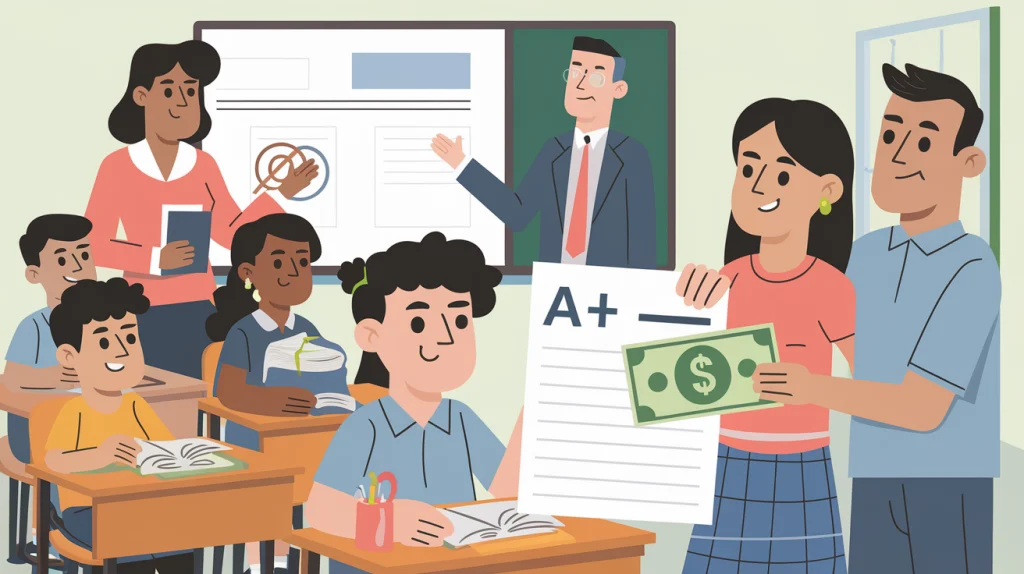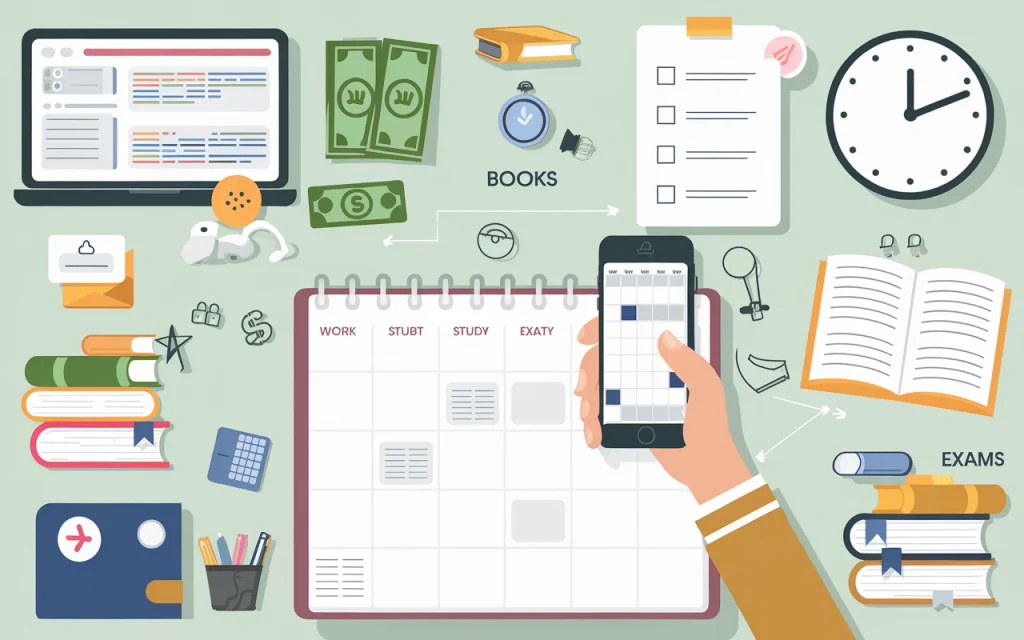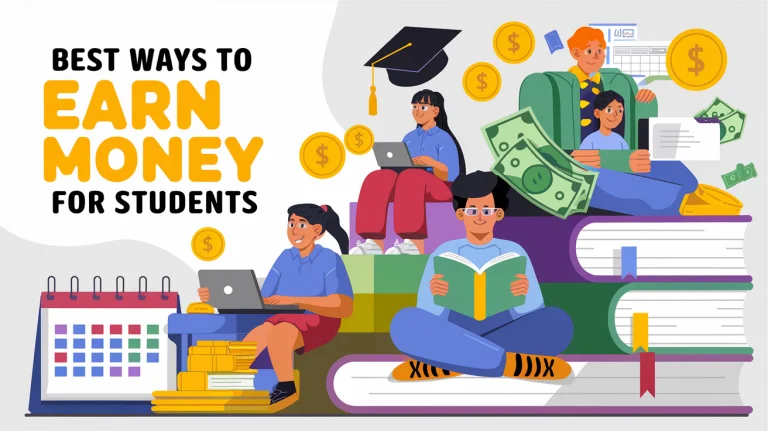Table of Contents
Before getting into details of the Best Way to Earn Money for Students, It’s good to remember that, Being a student is not just about studying. Sometimes, you might want or need to earn some extra money. Whether it’s to pay for school supplies, save for the future, or have spending money, earning money while you’re still in school can be very helpful. But, it’s important to find the best way to earn money for students that fits your life and doesn’t interfere with your studies.
Overview of Earning Money as a Student
Earning money as a student doesn’t have to be hard or take up all your time. Many students work part-time, freelance, or do small jobs that help them earn extra cash. There are many options out there that allow you to make money while still focusing on school. Some of these ways can even be done online or from home, so you can earn money without having to go anywhere.

Different Ways to Earn Money as a Student
- Online Jobs like freelancing or tutoring.
- Part-time Jobs include working in a store or a cafeteria.
- Selling Products like handmade crafts or things you don’t use anymore.
- Starting a Small Business such as offering services like babysitting or lawn mowing.
Why Students Might Need Extra Income
Students do ask about How. There are many reasons why students might want or need to earn extra income. Here are a few common reasons:
1. Paying for School Expenses
School can be expensive. You might need money to buy books, school supplies, or even help pay for tuition. Having a job can help cover these costs.
2. Saving for the Future
Many students like to save money for future goals, like buying a car, paying for college, or moving out on their own. Earning money now can help you save for things you’ll need later.
3. Gaining Experience
Working while in school can also help you gain important skills and experience. This can help you when you apply for future jobs or internships.
4. Personal Spending Money
Sometimes, students want a little extra money for fun activities like going to the movies, buying clothes, or hanging out with friends. Earning your own money means you can spend it on the things you enjoy!
What Is the Best Way to Earn Money for Students?
Finding the best way to earn money for students depends on what you like to do and how much time you have. Some students prefer working from home, while others may enjoy having a job outside. The key is to pick something that doesn’t take away too much time from school and homework.

| Method | Description |
|---|---|
| Tutor | Help other students with subjects you’re good at. Can be done in person or online. |
| Blogging | Write content on topics you’re passionate about and monetize through ads, sponsorships, or affiliate links. |
| Online Surveys | Participate in surveys from market research companies to earn small amounts of money. |
| Selling Used Items | Sell old or unused items online via platforms like eBay, Craigslist, or local marketplaces. |
| Babysitting | Offer babysitting services to parents in your community. |
| Graphic Designer | Create logos, social media graphics, or marketing materials for small businesses or individuals. |
| Paid Internships | Gain experience and earn money by working in an internship related to your field of study. |
| Creating an Online Course | Teach a subject you’re skilled in by creating and selling courses on platforms like Udemy or Teachable. |
| Data Entry | Simple clerical jobs involving inputting data for companies or clients. Can be done remotely. |
| Dog Walking or Pet Sitting | Earn money by taking care of pets in your neighborhood. |
| Freelance Jobs | Offer services like writing, design, or programming through platforms like Upwork or Fiverr. |
| Virtual Assistant | Provide administrative support to businesses or individuals remotely. |
| Freelancing | Offer specialized skills (writing, web design, etc.) on freelancing websites. |
| Sell Stock Photography | Take high-quality photos and sell them to stock photo websites like Shutterstock or Adobe Stock. |
| Translator | Offer translation services for documents or websites if you’re fluent in multiple languages. |
| Affiliate Marketing | Promote products and earn a commission on sales through affiliate programs. |
| Campus Jobs | Work part-time on campus in roles such as library assistant, research assistant, or administrative support. |
| Gig Economy Jobs | Take part in gig economy jobs like ridesharing, food delivery, or task-based work on apps like Uber and DoorDash. |
| Housesitting | Take care of someone’s home while they’re away, usually for an agreed-upon fee. |
| Instagram Influencer | Build a following on Instagram and monetize it through brand collaborations and sponsored posts. |
| Monetizing Your Hobbies | Turn hobbies like photography, crafting, or painting into a side business by selling your work online. |
| Sell Textbooks | Sell old textbooks that you no longer need to other students or online. |
| Sell Your Notes | Share your study notes with classmates or sell them online to help others prepare for exams. |
| Selling Online | Start your own online store through platforms like Etsy or Shopify to sell crafts, clothing, or digital products. |
Online Jobs for Students
One of the easiest ways to earn money as a student is by working online. Here are some ideas for online jobs:
- Tutoring: If you’re good at a subject, you can help younger students by tutoring them online.
- Content Creation: You can write articles, create videos, or start a blog and make money through ads or sponsorships.
- Surveys and Micro-tasks: Some websites pay you to take surveys or do small tasks like testing apps or reviewing products.
- Selling Products Online: You can sell things you make, like jewelry or artwork, on websites like Etsy or eBay.
These jobs allow you to work from home and make your own schedule.
Part-Time Jobs with Flexible Hours
If you want to earn money while also getting out of the house, a part-time job is a great option. Here are some jobs with flexible hours for students:
- Working in a Café or Restaurant: These jobs often let you work after school or on weekends.
- Retail Jobs: You can work in clothing stores or grocery stores. Many places hire students for evening or weekend shifts.
- Babysitting or Pet Sitting: Watching someone’s kids or pets is a great way to earn money without working long hours.
- Delivery Driver: If you have a bike or car, you can deliver food for companies like Uber Eats.
Freelancing Opportunities
Freelancing means you offer your skills to different people or companies. As a freelancer, you can set your own hours and choose what projects to work on. Here are some popular freelancing jobs for students:
- Graphic Design: If you’re good at art or using design software, you can create logos, posters, or websites for people.
- Writing: If you enjoy writing, you can write articles, blog posts, or even edit other people’s work.
- Social Media Management: Many businesses need help running their social media accounts. You can create posts, reply to comments, and help them grow online.
Freelancing lets you work on things you enjoy and improve your skills while earning money.
Starting a Small Business
If you’re creative or have a skill, starting a small business can be a fun way to earn money. Some great ideas to get started.
- Selling Crafts or Art: You can sell things you make, like jewelry, paintings, or knitted items, to friends or online.
- Lawn Care or House Cleaning: Offering services like mowing lawns or cleaning houses in your neighborhood is a great way to earn extra cash.
- Tutoring or Lessons: If you’re good at a sport, musical instrument, or school subject, you can offer lessons to others.
Starting a small business takes time and effort, but it can also teach you how to manage money and be responsible.
Investing and Passive Income Ideas
If you’re interested in earning money without having to work a lot, investing might be a good option. Here are some ideas for passive income (money you can earn without doing much work):
- Savings Account: Put your money in a savings account that earns interest over time.
- Stocks: You can invest in the stock market. As the companies grow, so does your money.
- Blogging or YouTube: Once you build a blog or YouTube channel, you can earn money from ads without having to do new work every day.
Remember, passive income takes time to build but can be a great way to earn money in the long run.
Overview of the Best Earning Methods for Students
To sum up, here are the best ways for students to earn money:
- Online Jobs like tutoring or content creation.
- Part-Time Jobs with flexible hours like working in a café or babysitting.
- Freelancing in spots like graphic design structure or writing or
Amazon Make Money Reviewing Products. - Starting a Small Business offering services or selling crafts.
- Investing or finding ways to earn passive income.
Each of these methods allows you to earn money while still focusing on school. The best way to earn money for students is the one that fits your schedule and interests!
Should Students Earn Money?
Many people wonder if students should earn money while they are still in school. There are good things about working as a student, but there are also some challenges. Let’s look at both sides!

Benefits of Earning Money While Studying
There are several reasons why earning money can be a good idea for students:
- Learning Responsibility: When you have a job, you learn how to manage your time and be responsible. This is a great life skill.
- Gaining Work Experience: Starting to work while you’re still a student helps you gain experience. This can make it easier to get a job after you finish school.
- Helping with Expenses: Whether it’s buying books, school supplies, or just having extra money for fun, earning your own money can help with these costs.
- Saving for the Future: Earning money as a student lets you save for things like college or a car.
- Boosting Confidence: Having your own job and earning money can make you feel more independent and confident.
Potential Drawbacks and Challenges
While earning money as a student has many good sides, there can also be some challenges:
- Less Time for Studies: If you work too much, you might not have enough time for homework or studying.
- Feeling Tired: Balancing work and school can make you feel tired, especially if your job has long hours.
- Stress: Juggling school and work can sometimes feel stressful if you have too much to do.
- Missing Out on Fun: Having a job might mean you miss some fun activities with friends or family.
It’s important to think about how much work you can handle without letting it affect your studies or happiness.
Balancing Work and Academic Responsibilities
Balancing work and school is the key to success. Here are some tips for students who want to earn money but also do well in school:
- Choose a Job with Flexible Hours: Part-time jobs or freelance work that lets you choose your hours are great for students.
- Make a Schedule: Write down when you have school, homework, and work. This will help you manage your time better.
- Don’t Work Too Much: It’s important to not take on too many hours at work. Your education should still come first.
- Take Breaks: Make sure to give yourself time to rest and relax. Breaks are important to avoid feeling tired and stressed.
By finding a balance, students can earn money without hurting their schoolwork.
Impact on Academic Performance
How working affects a student’s grades depends on how well they manage their time. Some helful ways it can leave an a good impact on performance:
- Positive Impact: For students who can balance their schedule, working can help them learn better time management and focus, which can improve their grades.
- Negative Impact: If a student works too many hours, they might get tired, have less time to study, and their grades could go down.
It’s important to always remember that school should come first. Working is good, but getting a good education is even more important for your future.
Should Students Earn Money for Good Grades?
Some people believe that students should get money as a reward for getting good grades in school. But is this a good idea? Let’s explore the idea of earning money for doing well in school and see the good and bad sides of it.

The Concept of Incentivizing Academic Performance
Incentivizing means giving a reward for doing something. In this case, it means giving students money when they get good grades. Some parents, schools, or even programs offer this as a way to motivate students to study harder.
The idea is that if students know they can earn money, they might try harder to do well in school. This reward system is like getting paid for hard work. It can be a way to show students that their effort in school is valuable.
Pros and Cons of Reward-Based Earning
Let’s look at the good and bad sides of this idea:
| Pros | Cons |
|---|---|
| Motivation: Students might work harder to get good grades if they know they’ll earn money. | Focus on Money, Not Learning: Students might start focusing only on the money and not on learning the material. |
| Teaches Hard Work: It helps students understand that hard work can lead to rewards, like in real jobs. | Pressure: Some students might feel extra pressure to always get good grades, which can cause stress. |
| Boosts Confidence: Getting rewarded for good grades can make students feel proud of their achievements. | Not a Long-Term Solution: Once the reward is gone, students may lose motivation to do well in school. |
It’s important to think about both sides before deciding if giving money for good grades is the right choice.
Alternatives to Earning Money for Good Grades
If earning money for grades doesn’t seem like the best idea, there are other ways to encourage students to do well in school:
- Praise and Recognition: Telling a student how proud you are of their hard work can be just as powerful as money.
- Non-Monetary Rewards: Instead of giving money, you could offer other rewards like extra screen time, a special outing, or a new book or game.
- Setting Goals: Help students set academic goals, and celebrate when they reach them. This teaches them to be proud of their efforts.
- Encouraging Passion for Learning: Instead of focusing on grades, help students develop a love for learning. This can lead to success without the need for rewards.
These alternatives can help students stay motivated and feel good about their achievements without needing money as a reward.
How to Encourage Academic Achievement Without Monetary Incentives
Here are some ways to help students succeed in school without using money as a reward:
- Supportive Environment: Create a positive space where students feel encouraged to learn and ask questions.
- Healthy Study Habits: Teach students good study habits, like setting aside time for homework and taking breaks.
- Celebrate Effort, Not Just Results: Praise students for their hard work, even if their grades aren’t perfect.
- Fun Learning: Make learning fun by using games, challenges, and interactive activities to keep students interested.
These methods can help students enjoy learning and do well in school because they want to, not just for money.
Top Online Earning Methods for Students
The internet has made it easier for students to earn money while studying. There are lots of jobs and tasks that students can do from home, using just their computer or phone. Here are some of the best online earning methods for students:

Freelancing Platforms (e.g., Upwork, Fiverr)
Freelancing means doing small jobs for different people without being hired full-time. There are platforms like Upwork and Fiverr where students can offer their skills and get paid for completing tasks. Some examples of freelancing jobs include:
- Writing: You can write articles, blogs, or even stories for people.
- Graphic Design: If you are good at drawing or using design software, you can create logos or images.
- Video Editing: You can help edit videos for YouTube or social media.
Freelancing lets you work when you want, so it’s great for students who need flexible hours.
Online Tutoring Services
If you’re good at a subject, you can teach others online! Websites like Chegg Tutors and Tutor.com let students teach younger kids or even adults in subjects like math, science, or English. You can make money while helping others learn.
- Adjustable Hours: You can pick when you want to teach or conduct classes.
- Helps You Study: Teaching someone else can also help you improve your own understanding of the subject!
Content Creation (Blogging, YouTube, etc.)
If you enjoy creating things like videos, writing, or taking photos, you can earn money through content creation. Here are some options:
- Blogging: Start a blog about something you love, like travel, food, or technology. You can earn money through ads or sponsored content.
- YouTube: If you enjoy making videos, start a YouTube channel. Once you get enough viewers, you can earn money from ads.
- Social Media: Platforms like Instagram or TikTok also let you earn money through sponsored posts or affiliate marketing.
Content creation takes time to build up, but it can be a fun way to earn money.
Selling Products or Crafts Online
If you’re crafty or creative, you can make and sell items online. Websites like Etsy are great for selling handmade crafts, art, jewelry, or clothes. You can also sell used items on eBay or Facebook Marketplace. It’s an easy way to make extra money by selling things you already have or make!
- Art: Sell your drawings, paintings, or digital designs.
- Jewelry: Make and sell handmade jewelry or accessories.
- Clothes: Create custom clothing or sell used clothes you don’t need anymore.
Survey and Market Research Jobs
There are websites that pay students to take surveys or be part of market research studies. Companies want to know what people think about their products, and you can get paid to share your opinion. Some survey websites include:
- Swagbucks
- Survey Junkie
- InboxDollars
These jobs are easy to do and don’t take much time, but they usually don’t pay a lot of money. However, it can be a simple way to make some extra cash in your free time.
Part-Time Jobs That Fit Student Schedules
If you want to earn money while studying but prefer working outside of the internet, there are part-time jobs that students can do. These jobs allow you to work for a few hours a day, and you can still focus on your schoolwork.

Retail and Hospitality Jobs
One common part-time job for students is working in retail (stores that sell things like clothes or groceries) or hospitality (restaurants, hotels, cafes). Here are some examples:
- Cashier: You can work at a store, helping customers pay for items.
- Waiter/Waitress: You can work in a restaurant, serving food to customers.
- Hotel Staff: You can work at the front desk, help clean rooms, or assist guests.
These jobs usually offer flexible hours, so you can work after school or on weekends. Plus, you can often get tips, which is extra money customers give for good service!
Campus-Based Jobs
Many schools and colleges offer part-time jobs for students right on campus. These are great because they are close to your classes, making it easy to balance school and work. Some examples of campus-based jobs include:
- Library Assistant: You help organize books and assist other students in the library.
- Office Assistant: You can work in the school office, answering phones, or helping teachers.
- Cafeteria Worker: You can help serve food in the school cafeteria.
Working on campus is convenient and can even help you make friends with other students.
Tutoring and Teaching Assistant Roles
If you are really good at a subject, you can become a tutor or a teaching assistant. Many schools let students help other students with their homework or classwork. Here are some options:
- Peer Tutor: You can help younger students or your classmates understand subjects like math, science, or language.
- Teaching Assistant: You help a teacher by grading papers, setting up lessons, or helping other students during class.
These jobs can also help you improve your own skills while making money.
Gig Economy Jobs (e.g., Food Delivery, Ridesharing)
The gig economy means working small jobs, or “gigs,” whenever you want. For example, you can work for food delivery services like UberEats or DoorDash. Some students even drive for Uber or Lyft, which are ridesharing services. Here are some gig jobs students can do:
- Food Delivery: Deliver food to people’s homes from restaurants.
- Ridesharing: Drive people to their destinations using your car.
- Task Jobs: Apps like TaskRabbit let you do small jobs like helping people move furniture or clean their homes.
How to Start a Small Business as a Student
Starting a small business while being a student can be a fun and exciting way to make money. You don’t need to spend a lot of money to begin, and you can learn how to manage both school and a business at the same time.

Business Ideas with Low Startup Costs
Here are some simple business ideas that don’t need a lot of money to start:
- Selling Handmade Crafts: If you like making things like bracelets, art, or T-shirts, you can sell them online or at local events.
- Baking and Selling Treats: If you enjoy baking cookies, cupcakes, or cakes, you can sell them to people in your neighborhood or at school events.
- Dog Walking or Pet Sitting: If you love animals, you can offer to walk dogs or take care of pets when people are away.
- Tutoring Younger Students: If you are good at a subject like math or reading, you can teach younger kids and help them with their homework.
- Cleaning Services: You can offer to clean homes, yards, or even cars for people in your area.
These businesses are easy to start, and you can run them in your free time after school or on weekends.
Tips for Managing a Business and Studies
Running a business as a student means you have to balance both your schoolwork and your business tasks. Here are some tips to help:
- Make a Schedule: Plan your day so you have time for school and your business. Make sure you don’t let one affect the other.
- Start Small: Don’t try to do too much at once. Start with a few customers and grow your business slowly.
- Ask for Help: If you feel overwhelmed, ask your family or friends for help with your business.
- Use Technology: There are apps that can help you manage your time, track your sales, and communicate with customers.
Managing both a school and a business can be challenging, but with good planning, it’s possible!
Success Stories of Student Entrepreneurs
Many students have successfully started small businesses while still in school. Here are a couple of examples:
- Ben Francis: He started a fitness clothing brand called Gymshark while he was a student. Now, it’s one of the biggest fitness brands in the world.
- Moziah Bridges: He started his own business called Mo’s Bows at just 9 years old, making and selling bow ties. His bow ties became really popular, and now he runs a successful company.
These students turned their hobbies into successful businesses, and you can too!
Resources and Tools for Student Entrepreneurs
To help you start and manage your business, there are many resources and tools available. Here are some useful ones:
- Online Marketplaces: Websites like Etsy or eBay allow you to sell your crafts or products to people around the world.
- Business Apps: Apps like QuickBooks can help you keep track of your money, while Trello can help you manage tasks.
- School Resources: Some schools offer programs or clubs for student entrepreneurs. These can help you get advice or connect with other students starting businesses.
- YouTube Tutorials: You can find many free tutorials on YouTube that teach you how to start a business, manage money, and even market your products.
With the right resources and a bit of hard work, any student can start and grow their own business!
Passive Income Ideas for Students
Passive income means earning banknotes without operating all the time. It might take a little effort at first, but once it’s set up, you can keep earning money even while you’re busy with school. Here are some easy ideas for students to earn passive income.

Investing in Stocks or ETFs
One way to make passive income is by investing in stocks or ETFs (Exchange Traded Funds). Here’s how it works:
- Stocks: When you buy a small piece of a company (called a stock), if the company does well, your stock’s value goes up. You can sell it later to make money.
- ETFs: These are like bundles of stocks. You invest in a group of companies instead of just one. It’s less risky and a great way to start investing with less money.
Even though investing can be exciting, it’s important to learn and understand how it works before you start. You can use apps like Robinhood or E*TRADE to invest.
Affiliate Marketing
Affiliate marketing is when you promote products online, and if someone buys the product using your special link, you earn a commission (a small piece of the sale). Here’s how students can do it:
- Pick a Product: Choose products or services that you like and think others will want.
- Join Affiliate Programs: Websites like Amazon or ClickBank offer affiliate programs. When someone clicks your link and buys, you get paid!
- Share Your Link: You can share your affiliate links on social media, blogs, or YouTube.
Affiliate marketing is a great way to earn money, especially if you like sharing things you enjoy with others.
Creating Digital Products (eBooks, Online Courses)
If you have knowledge or a skill you can share, you can make money by creating digital products like eBooks or online courses.
- eBooks: You can write a short guide or story about something you’re good at (like math tips or how to bake cookies). Then, you can sell it on websites like Amazon Kindle.
- Online Courses: If you’re good at something, like art or playing a musical instrument, you can create a video course and sell it on platforms like Udemy or Teachable.
Once you create these products, you can keep selling them and making money without doing any more work!
Renting Out Personal Assets (e.g., Textbooks, Equipment)
Another way to earn money is by renting out things you own. If you have items that others need, but you’re not using them all the time, you can rent them out.
- Renting Textbooks: Instead of selling your used textbooks, you can rent them to other students. Websites like Chegg or Amazon allow you to rent textbooks online.
- Renting Equipment: If you have a camera, sports gear, or even a bike, you can rent these to people who need them for a short time.
This is a great way to earn money without giving up your belongings. You can still use them when you need them!
Time Management Tips for Students Earning Money
When you’re a student and working to earn money, it can feel like there’s not enough time to do everything. But with good time management, you can balance both school and work. Some of simple tips to keep you on the right track.

Balancing Study and Work
Balancing study and work can be tricky, but it’s possible! Here’s how:
- Prioritize: Always put school first. Make sure you finish your homework and study before focusing on work.
- Plan Your Time: Use a calendar to write down when you have classes, assignments, and work shifts. This way, you can see how much time you have left for other things.
- Take Breaks: Don’t forget to give yourself time to rest. Breaks help you stay refreshed and focused when you get back to work or studying.
Setting Realistic Goals and Schedules
Setting goals helps you stay organized. But they have to be realistic, meaning you should set goals that are possible to achieve without too much stress.
- Daily and Weekly Goals: Write down what you need to do each day and week. Make sure your goals are small and manageable. For example, study for 30 minutes or work for 2 hours after class.
- Know Your Limits: Don’t try to do too much at once. If you’re feeling overwhelmed, it’s okay to say “no” to extra work or activities. Your health and studies are important.
Tools and Apps for Managing Time
There are lots of tools and apps that can help you manage your time better. Here are some that are easy to use:
- Google Calendar: You can schedule your classes, study time, and work shifts in one place. It can even send you reminders!
- Trello: This is a simple app where you can create to-do lists and organize tasks.
- Forest: This app helps you focus by growing a virtual tree when you avoid distractions (like using your phone) during study time.
These tools make it easier to keep track of what you need to do and when.
Overcoming Common Time Management Challenges
Sometimes, no matter how hard you try, time management can still be tough. Here’s how to overcome common challenges:
- Procrastination: If you’re putting things off, break big tasks into smaller steps. Start with the simplest task to get moving
- Feeling Overwhelmed: When you have too much to do, take a deep breath and focus on one task at a time. Prioritize what’s most important first.
- Distractions: Try studying or working in a quiet place, and turn off your phone notifications so you don’t get distracted.
Financial Management Tips for Students
Earning money as a student is great, but managing it wisely is even more important. Learning how to handle your money now can help you in the future. Here are some simple financial management tips that every student should know.

Budgeting and Saving Strategies
Budgeting means planning how you will spend your money, so you don’t run out too quickly. Here’s how to start:
- Track Your Income: Write down how much money you make every month from your job, freelancing, or other sources.
- List Your Expenses: Note down everything you spend money on, like food, transportation, books, or fun activities.
- Save a Little: Try to save at least 10% of what you earn. Even if it’s just a small amount, saving helps you prepare for unexpected expenses.
By creating a budget, you can avoid running out of money and have some savings for emergencies or future plans.
Managing Earnings and Expenses
Once you have a budget, the next step is managing your money well:
- Spend Wisely: Only buy things you really need. Before making a purchase, ask yourself if it’s necessary or if it can wait.
- Avoid Debt: Try not to borrow money unless you really need to. If you use a credit card, pay it off each month to avoid high interest charges.
- Keep Records: Keep track of all your earnings and expenses. It helps you stay aware of where your money is going.
Building Credit and Financial Literacy
Building credit means showing that you can be trusted to borrow money and pay it back. Here’s how to build good credit:
- Start with a Small Credit Card: If you’re ready, get a credit card with a low limit. Use it for small purchases and pay the full amount each month.
- Pay Bills on Time: Always pay your bills on time. This shows that you’re responsible and helps improve your credit score.
Financial literacy means understanding how money works. The more you learn about managing money, the better decisions you can make in the future.
Avoiding Common Financial Pitfalls
Here are some common financial mistakes students make and how to avoid them:
- Impulse Buying: Don’t buy things just because they seem cool at the moment. Think carefully before making purchases.
- Not Saving Enough: It’s easy to forget about saving when you’re young, but even small savings add up over time.
- Ignoring Credit: Some students avoid credit cards completely, but it’s important to build credit wisely. Just don’t overuse it!
Legal and Tax Considerations for Student Income
When students start earning money, there are a few legal and tax rules they need to know about. It may sound complicated, but don’t worry—it’s not too hard once you understand the basics!

Understanding Tax Obligations for Student Earnings
If you’re earning money, you may need to pay taxes. Taxes are money you pay to the government from your earnings. Things to know better for LTS for students:
- Do All Students Pay Taxes?: Not all students need to pay taxes. It depends on how much you earn. If you make over a certain amount, you will likely need to pay taxes. The state sets this charge per year.
- Why Do We Pay Taxes?: Taxes help the government pay for things like schools, roads, and healthcare. It’s important to pay them if you earn above the required amount.
Even if you don’t earn enough to pay taxes, you might still need to file a tax return.
Legal Requirements for Freelancers and Small Business Owners
If you’re doing freelance work or running a small business, there are a few more things to keep in mind:
- Registering Your Business: Some students who start small businesses may need to officially register their business, depending on where they live and how much they make.
- Freelancing Rules: If you’re freelancing (like working on Fiverr or Upwork), you might be considered self-employed. This means you’ll have to keep track of your income and report it when paying taxes.
Make sure you check the rules for your country or state. You may need to follow some legal steps if you’re earning a lot of money or running a business.
How to File Taxes as a Student
Filing taxes means sending information about how much you earned to the government. Here’s a simple way to understand the process:
- Collect Your Earnings Information: Keep track of all the money you earned throughout the year. You may get a form from your employer or freelance clients that shows how much you made.
- Use Tax Software or Ask for Help: There are easy-to-use programs that help you file taxes, or you can ask a tax professional for help.
- Submit Your Tax Return: After filling in the forms, you submit them to the government. If you paid too much tax, you might get a refund!
Conclusion
Recap of the Best Ways to Earn Money for Students
Earning money as a student is a great way to gain experience and become more independent. There are many ways students can make money, such as:
- Online Jobs: Freelancing, content creation, or tutoring online.
- Part-Time Jobs: Flexible jobs like working in retail, food delivery, or on-campus roles.
- Starting a Small Business: Starting a business with low startup costs can be a fun and rewarding way to earn money.
- Passive Income: Earning through investments, affiliate marketing, or creating digital products.
These methods not only help students earn money but also teach valuable skills that will be useful in the future.
Final Thoughts on Balancing Work and Education
While earning money is helpful, it’s important to keep a balance between working and studying. School is the main priority for students, so managing time well is key. Setting clear goals, using time management tools, and not overworking are all important for maintaining this balance.

Remember, earning money should help you grow, not stress you out. With the right balance, students can successfully manage both work and their education.
FAQs
What Is the Best Way to Earn Money for Students?
The best way depends on your skills and schedule. Online jobs like freelancing, tutoring, or content creation can be flexible and high-paying. Part-time jobs and small businesses are also good options if you prefer working in person or starting something of your own.
Should Students Earn Money?
Yes, earning money can be a great experience for students. It helps them become more responsible, manage finances, and gain valuable work experience. However, it’s important to ensure that work doesn’t interfere with their education.
Should Students Earn Money for Good Grades?
While some believe in rewarding students with money for good grades, it’s not always the best way to motivate students. Encouragement, praise, and helping students set personal goals can be more effective in promoting academic success.
How Can Students Balance Earning Money and Studying?
Balancing work and studies requires good time management. Students should set realistic goals, use tools like calendars or scheduling apps, and not take on too many responsibilities. Making a plan to prioritize schoolwork will help keep things in balance.
